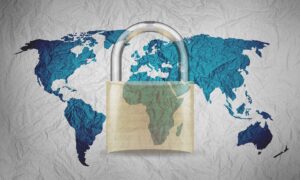 Did you know that approximately 1 in 4 international travelers have been victims of hacked devices when using public Wi-Fi? This is a surprising statistic for many, but unfortunately it’s a fact of life in our increasingly connected world. Whether abroad or in the U.S. there are steps you can take to reduce your risk of passwords, bank information, and other personal data being stolen which can not only spoil a vacation but can also cause headaches once you return home. Here are some best cybersecurity practices you can take on your next getaway.
Did you know that approximately 1 in 4 international travelers have been victims of hacked devices when using public Wi-Fi? This is a surprising statistic for many, but unfortunately it’s a fact of life in our increasingly connected world. Whether abroad or in the U.S. there are steps you can take to reduce your risk of passwords, bank information, and other personal data being stolen which can not only spoil a vacation but can also cause headaches once you return home. Here are some best cybersecurity practices you can take on your next getaway.
Know your Wi-Fi connection. When in an airport, hotel, train station or café you may not know what the legitimate public Wi-Fi network is, and hackers know this. They can set up fake Wi-Fi hotspots (known as “evil twins”) that look like legitimate networks such as “Free Hotel Wi-Fi” or “Guest Wi-Fi” but are actually fakes used to collect personal information. Because of this, it’s a good idea to ask staff for the exact network name and password of the establishment you’re visiting. You should never use a free public Wi-Fi network to access any account that contains personal information that if stolen could hurt you. Never enter data such as a CC# when using free Wi-Fi. A hotel Wi-Fi connection that requires your last name and room # to log in is safer than any free service that does not. It’s better to utilize your cell phone’s data than free public Wi-Fi.
Install a VPN. Even if you’re connected to a legitimate network, that may not be enough. For this reason, experts recommend connecting your device to a VPN which acts as a private tunnel, hiding your IP address and allowing you to use public Wi-Fi networks safely. Otherwise, you may fall victim to a “man in the middle” attack, where a hacker places their device between yours and the network and ends up being able to view your online activity, passwords, credit card details, and other information. If you absolutely must conduct personal banking when abroad, make especially sure to have a VPN and verify the network is legitimate. NordVPN is one option but there are others.
Do some homework before leaving home. Before going abroad, it’s a good idea to secure your electronic devices by backing up electronic files, removing personal information (Social Security number, name, banking information) from the device, and making sure it’s updated with the latest operating system including any anti-virus software you may have. This should be a common practice even at home, but strong passwords should also be set up before going on vacation. This includes words and phrases, numbers, and symbols that cannot easily be guessed. The longer the password the better. Also update your mobile apps prior to traveling; they can be a safer option that logging directly into a website because they are housed on your device as opposed to another website server.
Keep an eye on your surroundings. When in public locations, stay cognizant of your surroundings. Make sure nobody is spying on any screens while electronics are being used, and consider using a privacy screen on your laptop, which is a cover for your monitor that makes it harder for others to see on-screen activity.
Update passwords frequently. Since you’re at an elevated risk of your personal data being compromised being abroad, it’s smart to change your passwords once you return home. That way any information that may have been compromised won’t be accessible to criminals with your old password.
There is no way to eliminate all risks of having your personal information taken by hackers, but by taking a few steps you can drastically reduce your chances of experiencing some real headaches. If you have any other tips, leave us a comment at Facebook.com/SVandTP!

 My goal is to simplify travel-planning through an equal exchange process where I acquire your ideas and expectations for your trip relieving you of the worry, hassle, stress and time that accompanies Do-It-Yourself planning.
My goal is to simplify travel-planning through an equal exchange process where I acquire your ideas and expectations for your trip relieving you of the worry, hassle, stress and time that accompanies Do-It-Yourself planning.